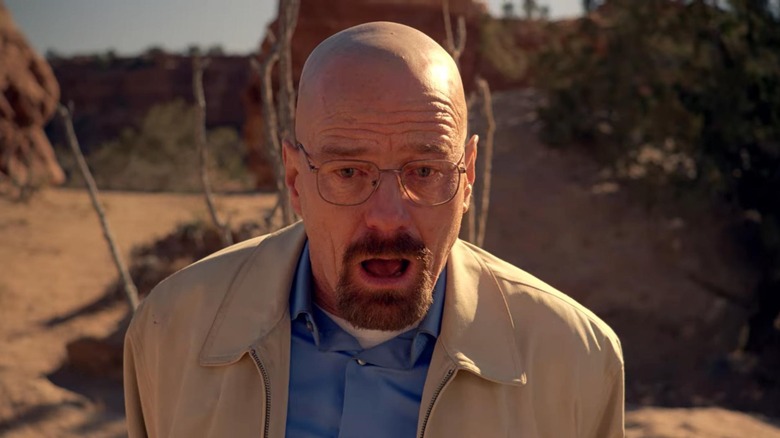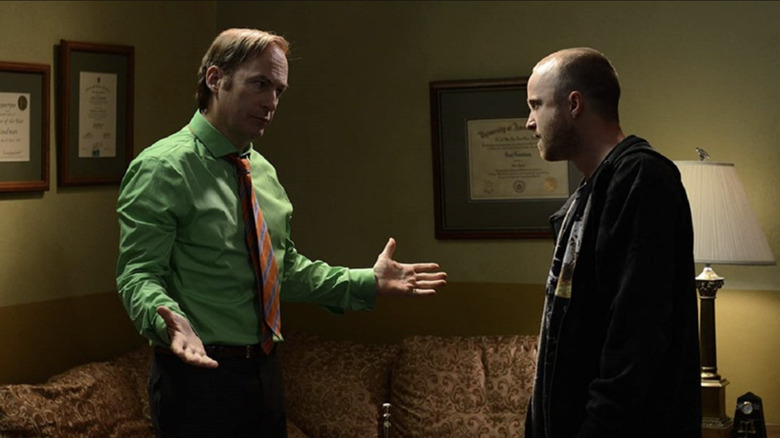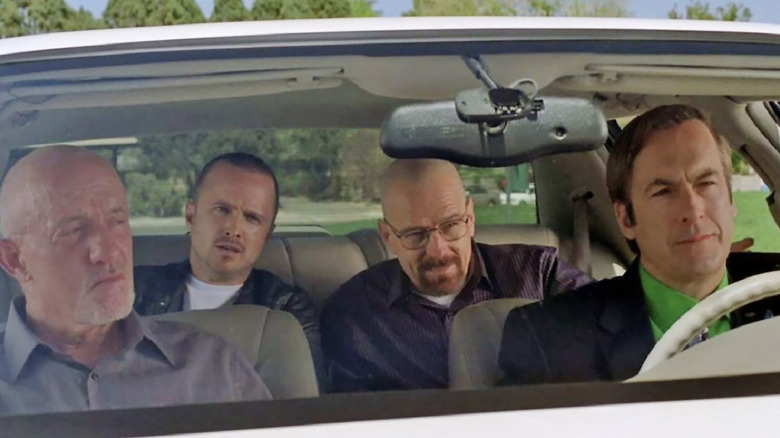Why Vince Gilligan Would Change Nothing About Breaking Bad
The old saying goes that hindsight is always 20/20, but if you're someone as talented as Vince Gilligan and the rest of the crew behind "Breaking Bad," your foresight may as well be 20/20, too. The stories of "Breaking Bad," "Better Call Saul," and "El Camino: A Breaking Bad Movie" work in synchrony to tell one big narrative about an ensemble of interconnected characters. Walter White's drug trafficking endeavors paired excellently with Saul Goodman's criminal lawyer enterprise, with both stories culminating in an epilogue of sorts seen in the final season of "Better Call Saul" and the Jesse Pinkman-centered film "El Camino."
The careful planning around making these projects complement one another couldn't have been easy. By the time "Better Call Saul" and "El Camino" rolled around, the story of "Breaking Bad" had already been finished. The intricate designs surrounding the characters' fates and the threads left unpulled would require "Better Call Saul" to perform the delicate balancing act of telling a compelling story that could stand on its own without compromising or contradicting what came before. Considering what was accomplished, it's not surprising that Vince Gilligan, the creator of "Breaking Bad" and the co-creator of "Better Call Saul," looks back on everything fondly.
More specifically, Gilligan sees "Breaking Bad" as something he wouldn't change at all.
Keeping the continuity in check
While talking to Rolling Stone about his final turn as a writer/director on "Better Call Saul," Vince Gilligan looked back at the difficulties of writing a pre-"Breaking Bad" Saul Goodman and how it only got easier the closer the timeline got to the original series:
"I think it was really, really challenging in the first season, and in the early seasons. But I should say that it had been a couple of years since I'd been in the writers room before this season. I remember in the early days, when we were trying to figure out, 'Jimmy McGill, where does Saul Goodman come from? We can't kill him off! He can't lose an eye!' There's so many of these strictures that 'Breaking Bad' put on this character. But this season, man, not so much. I mean, it's always tough. But it seemed like it was harder in the early going."
The early seasons of "Better Call Saul" have Jimmy McGill seem like a completely different character than the Saul Goodman we know in "Better Call Saul." Crafting the character's backstory and supporting cast must have been a challenge, given that any single inconsistency would break the cohesive story they were trying to make with the events of "Breaking Bad."
Not a detriment, but a challenge
Hearing Vince Gilligan talk about what a struggle it was to keep the mold of "Breaking Bad" intact during the early "Better Call Saul" years raises the question: is there anything Gilligan would change about "Breaking Bad" to make working on the prequel series easier? According to Gilligan in the same interview, he feels that no such retroactive changes are necessary:
"I think it's telling that I can't think of a good answer off the top of my head, even having pondered it for a few minutes here. There are certain moments where we thought, 'Gee, it would be better if this character lived' or 'It would be better if we could kill this character.' But none of it to our detriment, that I recall. It's a challenge: Do you want the Rubik's Cube to be any easier, if you're a Rubik's Cube puzzle-type solver? No, you don't. Especially in hindsight once you've solved it. I don't really regret anything we did."
Vince Gilligan's inability to find anything about "Breaking Bad" that he would want to change shows how tightly scripted the series was. Every character served a larger purpose within the story's context while also being compelling in their own right. The storytelling efficiency of "Breaking Bad" wouldn't serve as a "detriment," as Gilligan himself said. Instead, the world-building and characters introduced in "Breaking Bad" would serve instead as a challenge to the creative team of "Better Call Saul." Not just to keep continuity intact, but to tell a story as good as the one that came before.


